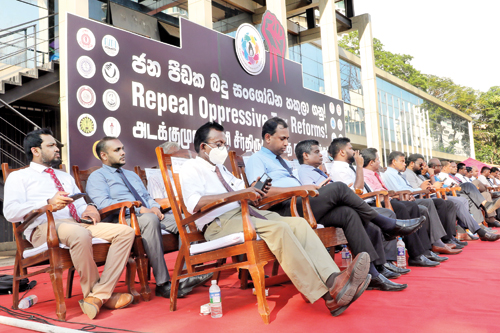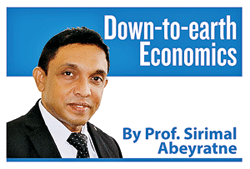IMF and protests: Bitter pills to swallow
View(s):Perhaps, some do not understand or do not choose to understand that there has been some degree of policy corrections underlying the economic turnaround. What has so far been done is far little, compared to what needs to be done during this year and the years to come. If not for that, there is a greater possibility for another turnaround of the economy back to its crisis status – it’s the nature of Sri Lanka’s “yo-yo economy” as we discussed last week in this column.

File picture of a protest against high taxes
The only thing we need to understand is that “we are still dependent on foreign borrowings”. Without saying that, we term it in a nicer way: We have improved our status again to get access to international capital markets, to multilateral and bilateral financial sources, international bond markets – Eurobonds, Green bonds and Blue bonds. All these mean that Sri Lanka which had lost its credit worthiness can be considered again as worthy for lending, if anybody wants to believe it.
Bitter pills to swallow
Today I decided to focus on some of the “bitter pills” that we had to swallow in order to bring the economy at least to its current status. In opposing such bitter pills – particularly the personal income tax (PIT) hikes – there are widespread trade union protests in the country. Whether to support PIT paying colleagues or not, even those who don’t pay PIT are also sometimes on strike!
In this country, we have maintained the luxury of launching strikes on full-pay, even if we don’t work! While politicians do support such movements anticipating a political mileage at the next elections, no government dares to say that “employees shouldn’t get their pay for the days they don’t work”.
I do admit the devastating negative impact of the PIT hikes on the tax-paying middle-income salary earners, who earn higher than Rs. 100,000 a month. Most of these employees – I believe it’s the overwhelming majority of employees in both the public and private sectors – have been maintaining their living and lifestyles according to their long-term average income levels.
They have borrowed against their salaries to build a house, to buy a vehicle, to pay for children’s education and other affairs, leaving a barely manageable amount as living expenses – to pay for utility bills, transport costs, health care, clothing and food. This component of monthly expenses has already got affected since last year due to high prices, increased fuel prices, increased utility costs and interest payments.
IMF conditionalities?
As some would look at the problem, it is all about IMF conditionalities forcefully imposed upon the country. In fact the IMF has also proposed its strategies to improve the macroeconomic fundamentals of the country. Its first and foremost recommendation is to prioritise “an ambitious revenue-based fiscal consolidation, accompanied by stronger social safety nets, fiscal institutional reforms, and cost-recovery based energy pricing”.
 Fiscal consolidation means bringing the government budget under the manageable levels, while it requires addressing the “revenue base” of the budget, as the IMF says. Sri Lanka’s budgetary management has been long suffering from its fundamental weaknesses, while these weaknesses are also due to politically motivated decisions, institutional failures, delays in tax administration system, and the lack of a cost-recovery pricing mechanisms.
Fiscal consolidation means bringing the government budget under the manageable levels, while it requires addressing the “revenue base” of the budget, as the IMF says. Sri Lanka’s budgetary management has been long suffering from its fundamental weaknesses, while these weaknesses are also due to politically motivated decisions, institutional failures, delays in tax administration system, and the lack of a cost-recovery pricing mechanisms.
Government revenue is estimated to increase from 8.5 per cent of GDP in 2022 to 15 per cent by 2025, while generating a surplus in the “primary balance” and reducing the “budget deficit” to manageable levels. Primary balance is the difference between government revenue and the non-interest recurrent expenditure liabilities, which is the “breathing space” of fiscal management. Sri Lankan fiscal operations have been in a dire situation for a long time as the government did not have such a breathing space compelling it to borrow excessively.
Exceptionally high risks
Even without the IMF, there is little room for dispute that we should have adopted similar strategy as our “own conditionalities” in order to address the country’s deep-rooted macroeconomic policy errors. The only difference would have been that Sri Lanka would not receive the Extended Fund Facility (EFF) of US$3 billion from the IMF and the disbursement of other foreign loans which have got stuck now.
Therefore, conditionalities are not to satisfy the IMF staff, but rather to meet domestic requirements in order to improve fiscal consolidation. But do we meet the requirements now? Assuming that the tax reforms would continue, and the economy will begin to perform better, the budget deficit is estimated to decrease from 10.4 per cent of GDP in 2022 to 5 per cent in 2025.
In support of this fiscal consolidation, there are other tax reforms already in the pipeline. These taxes include a property tax, a wealth transfer tax and other.
The IMF does not, however, anticipate that everything is set to move forward smoothly. It explicitly recognises that Sri Lanka has “exceptionally high” risks to programme implementation. As it identifies, Sri Lanka has a “weak track record of reform implementation” in the past so that this programme too runs significant risks of slippages regarding fiscal consolidation, revenue mobilisation, and reserves buildup.
A significant aspect of the risks is already visible with strikes organised by the public sector employees and their trade union protests on the streets. Perhaps, it is quite unusual that the IMF has had a virtual roundtable discussion with the protesting trade unions last week and has conveyed the possibility of revising some taxes at the time of its next review in six months.
The next risk factor involves the country’s election cycle that is scheduled to take place next year, whether its possible outcome is tested or not with the Provincial Council elections that might be held this year. The political parties which used to “pull the leg” have already ignored the crisis and have conveyed their plans to “provide relief” to the people!
Therefore, whether the country moves forward or backward is a choice, not in the hands of the IMF, but the people and their political leaders.
Is there a Plan B?
There is no Plan B and no political leaders and parties have come up with any alternative plan to lift the country out of the crisis. It has to be only though “correcting our past mistakes” whether such mistakes were carried out by our political leaders in the past who run the governments or the people who elected them to do so.
But there are a couple of improvements to support the recovery plan. Regarding fiscal consolidation, we must admit the fact that the “Sri Lankans are not used to pay income taxes”. If the tax base is broadened permitting every income-earner to participate in paying PIT, then the question of “exemptions” does not arise. With the establishment of a technology-based, efficient tax administration system, the government knows people’s income and wealth – a system that helps tax administration, safety net administration, and other.
Of course, the IMF strategies are concerned with not only fiscal consolidation, but also many other areas for corrections. These areas include debt sustainability, building foreign reserves, price stability, exchange rate flexibility, financial sector stability, and addressing the country’s corruption vulnerability.
Even with all that, there is a much more fundamental problem to be addressed – the foreign exchange problem. We cannot print foreign exchange; we must earn it. Macroeconomic stability does not survive without growth, while growth does not survive without exports that generate foreign exchange earnings.
(The writer is a Professor of Economics at the University of Colombo and can be reached at sirimal@econ.cmb.ac.lk and follow on Twitter @SirimalAshoka).
Hitad.lk has you covered with quality used or brand new cars for sale that are budget friendly yet reliable! Now is the time to sell your old ride for something more attractive to today's modern automotive market demands. Browse through our selection of affordable options now on Hitad.lk before deciding on what will work best for you!


